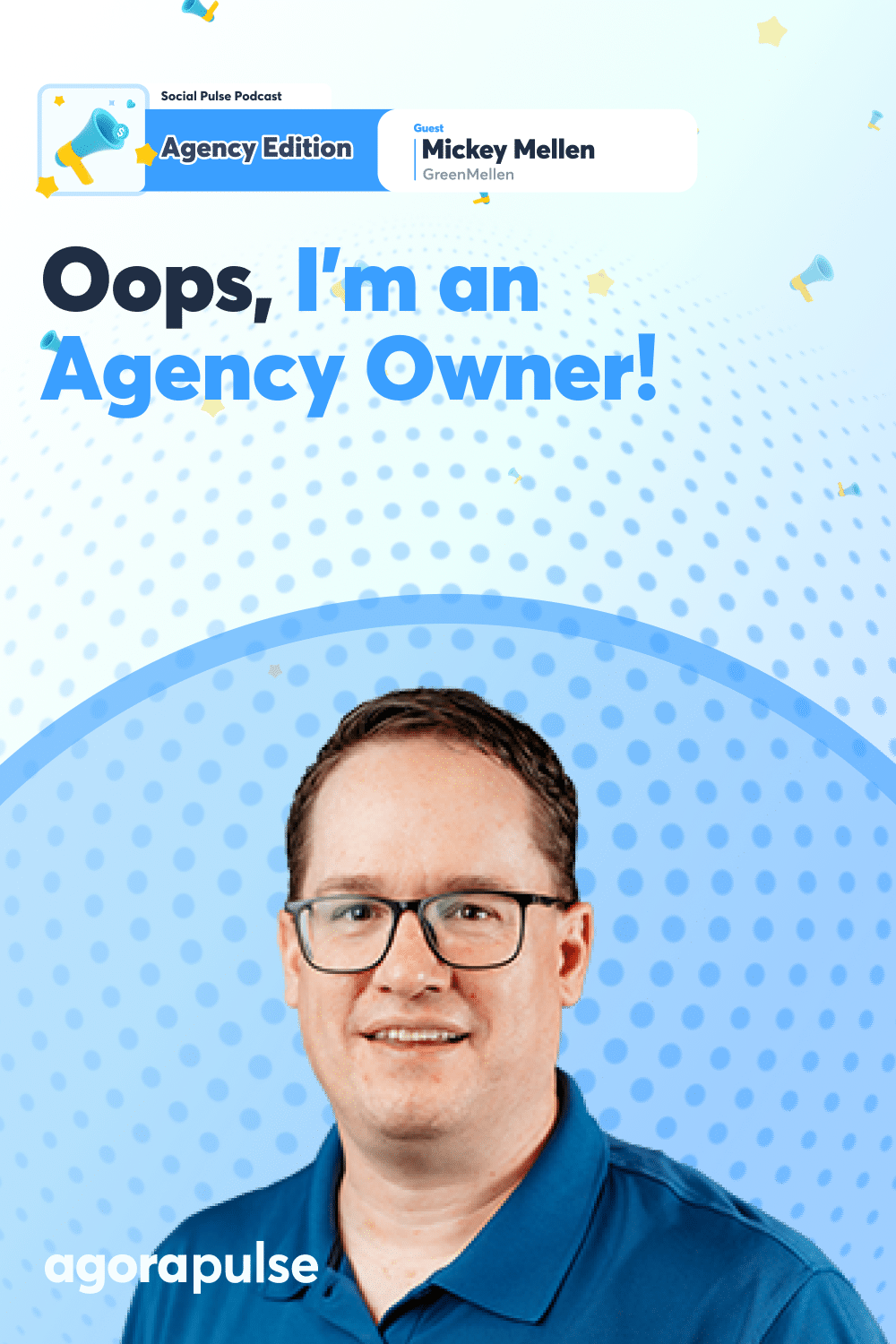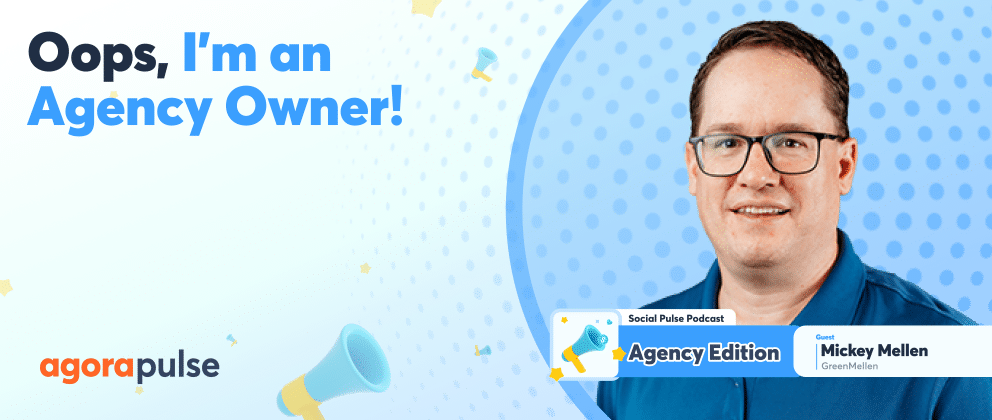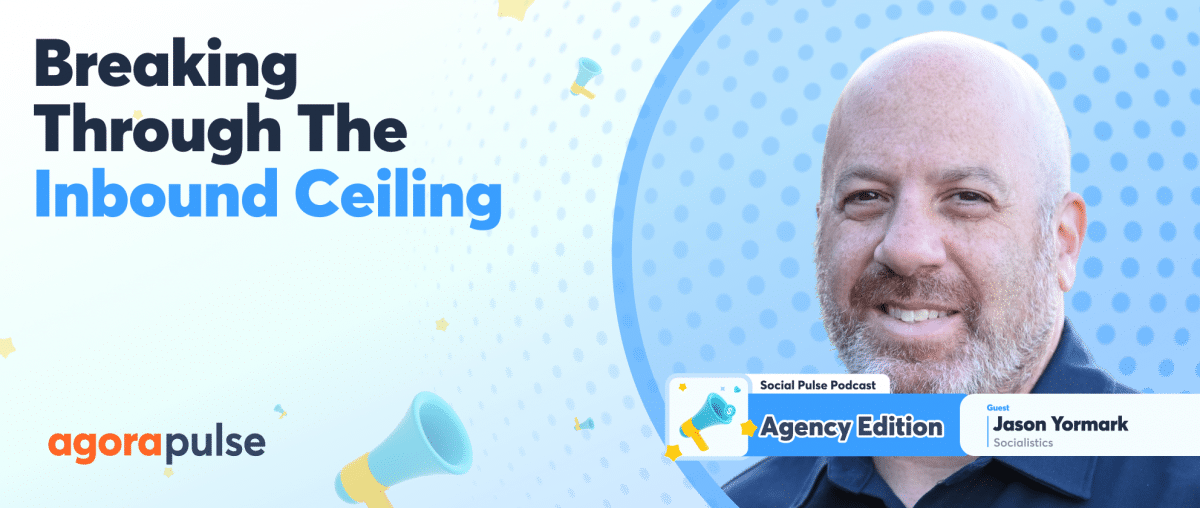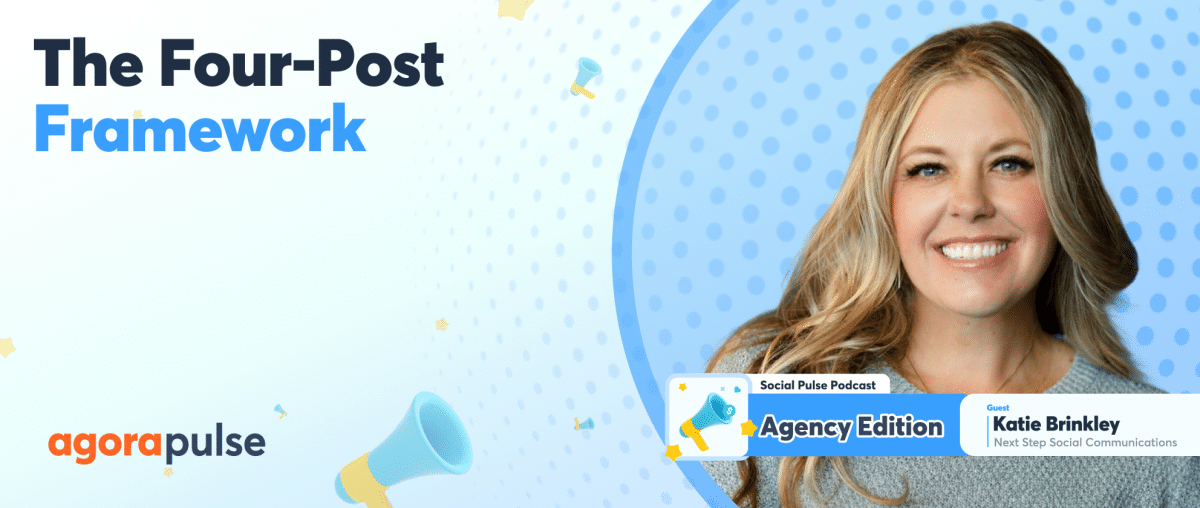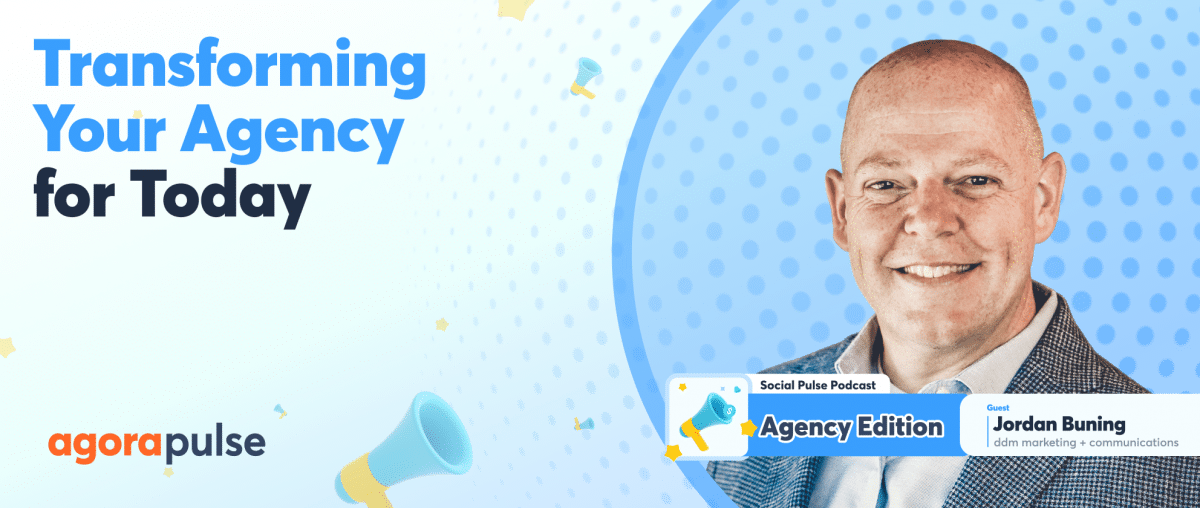Social Pulse: Agency Edition guest Mickey Mellen didn’t set out to start a thriving digital agency—yet today he’s not only successfully at the helm of Green Mellen Media but also a respected thought leader, community contributor, and expert at leveraging strategic frameworks for growth. In this article, Mickey shares his real-life journey of accidental agency ownership and reveals the frameworks, processes, and approach he’s used to turn a surprise start into an unstoppable success.
[Listen to the full episode below, or get the highlights of the Social Pulse: Agency Edition, powered by Agorapulse. Try it for free today.]
Tell me about the circumstances that led you to accidentally start Green Mellen Media.
Mickey Mellen: So initial moments [were] interesting, and we’ll get to that ’cause there wasn’t really a moment. But about 2005, I worked at a big church here just outside of Atlanta. One of the other people on staff with me at the church was Ali—Ali Grassy at the time, she became Ali Green, hence the Green Mellen. Cutting that long story short there. But we both worked at this church and both found our way out of it into separate freelance careers. She wanted to be a designer and is a fantastic designer and had a protege she was working under.
At the time, I ran a site called Google Earth Hacks, all about cool things you can do with Google Earth. A buddy of mine was running the Google Earth blog, writing about Google Earth stuff. And he was leaving to go on a circumnavigation. He’d sold his house and his cars and all that. Said, “Hey, Mickey, why don’t you run this blog for me, and I’ll give you half the revenue?” And it was a couple thousand bucks a month, and I had wanted to start a digital agency.
And that gave me the financial wherewithal to do it to leave my full-time job. ’cause I had this blog money coming in. I had to write a post today about Google Earth, which took some time, but still gave me plenty of free time to start this business. And then as time went on and really fairly quickly as I was helping companies build websites and do digital marketing, I’m not a designer, so I needed Ali’s help.
So I would say, “Ali, can you help me with this site?” She’d say, “Sure. Actually I need your help. Can you help me with this one over here? ‘Cause I can’t do the technical side of it.” And we did that a few times, and every month we’d settle up and say, “Okay, Ali I owe you $500 for that, but you owe me $200 for this and I owe you $300 there.”
And we settled up and eventually we said, “You know what? What’d you make last year?” And we just laid it on the table and it was neither of us made much at the time, 15 years ago. But it was almost the exact same amount: $38,000 or whatever it was at the time. It was identical.
We said, “Cool. This year let’s just put it in a pile and split it. And that way we’re not having to worry about who does what. We both do whatever jobs we can. We use each other as much as we can. See what happens.” And then as time went on, we said, “Hey, we need more help. We need another designer to help us. Let’s bring someone else to help us design.”
And I was getting a lot of websites to manage, so I said, “Let’s bring someone to help me manage websites. And I guess we need a little space where we can all get together. So let’s get a small office.” [It turned] into a company pretty quickly without really necessarily meaning to.
It was more just me and Ali trying to make our lives easier with how we pay each other and needing help turned into a small agency.
In those early stages, what were the biggest challenges?
Mickey Mellen: Yeah, it was tough.
So, working with Ali has been a blessing. People ask me, “How do you find a good partner like you guys have?” And I don’t really know. We just got super lucky with the way we work together—where our skills are so different, but our values are so similar—and our ideas for growth are so similar. It’s just a great balance there. But, again, it was more than just the two of us pretty quickly.
And hiring was tough. We had some contractors early on, but we knew pretty early on that if we did this, we wanted mostly full-time folks just so they could be with us and know all of our clients and just be part of the company. There are advantages both ways, but hiring a full-time person is a big deal, especially when you’re going from two to three or four to five, or, [in the] early days, you go from your fourth person to a fifth: That’s 20% more expense. It’s a big jump.
Your revenue’s climbing steadily, but your expenses take these big stair steps when you have to hire someone. Hiring has always been tough for us, and we’re at a beautiful point right now. Our team is fantastic. (If any of them are listening [or reading], we love you all. You are great.) There were struggles along the way. There were two different folks over the years. We had to let go just due to a bad fit and that kind of stuff. And one we let go a different way. Most of the hires have been fantastic, but a bad hire is expensive. If you’re a small company, money’s tight, and you make a bad hire that costs tens of thousands of dollars and you know what you paid them that you didn’t get value out of, and the time you spent hiring and all that.
That was probably one of our bigger challenges early on ’cause, in the early days, work came in pretty easily and largely always has. There are always struggles there, but it was the hiring and growing and really just not knowing what we’re doing because we didn’t plan to start this. We didn’t have our roadmap to follow and figure out what we’re going to do.
We were just figuring out as we went and we figured it out as we went.
What was the turning point for you in adopting frameworks like EOS?
Mickey Mellen: Correct. I’ve read all the Traction: Get a Grip on Your Business and Rocket Fuel books and all the books related to those.
To the growth question, I think that’s interesting, too, ’cause I think we don’t want to grow very large. We’re a team of nine, and we don’t want to get much bigger than that in terms of headcount.
But I still think it’s important—even if you want to stay smaller than that, or to your point, grow much bigger—to have a framework in place just to help you guide your business.
Traction and EOS: I wish I could remember who introduced me to the concept, but we gravitated toward them instantly. It was fantastic. It’s just a framework around your business and how you should organize your goals, and how your meeting cadence should look, and says, “Here’s how you should run your company.”
Again, as you said, it’s one way to do it. There are plenty of other ways to do it that are all pretty similar. I’ve read a lot of other books, including The 12 Week Year, and there are a lot of ’em that are basically the same framework with different jargon around it.
But Traction, EOS, is one of the bigger ones, and it’s worked well for us. It just says, “Hey guys, here’s how you should run a company. You should meet once a week to talk about this. You should set these kinds of goals, have a scorecard for these pieces, do this kind of planning for one year and three years, and just lay it all out.” And so we followed it loosely for a decade or so, and then in the last few years, we’ve hired a coach to help us do it right because we skimped some of the corners, and we were okay there, but he said, “No, let’s do this, right?”
Let’s follow the book and make it happen. And it’s helped a lot to get tighter on that.
Check out the episode with Matt Heinz earlier this season.
Are there any specific ways that particular framework has helped your agency?
Mickey Mellen: Yeah, there are a lot of little pieces there. Just setting the planning [and] setting the meeting cadence has been great.
I’ll tell you the one that affected us the most though was their IDS framework.
They have you basically put issues on the list to identify, discuss, and solve IDS and that shaped our world big time. So for years, for about 10 years, we had an office just outside of Atlanta. We’ve since gone to a coworking space as we become more remote, but we’re in the office every day, like a lot of companies.
And Ali, in particular, was just getting buried with legitimate requests from the team and legitimate requests. They would just need her all day. Just come in, ask you questions, and “Can I pop in?” and just bug her all day. And, again, in a good way, but in a way that makes it hard to work.
Having that IDS list was great. We said, “Hey, guys, you have something urgent? Please come tell us. If it’s something you need to ask us soon, put it on the list. We’ll meet with you once a week and take care of it.” So instead, she set up meetings and we both have set up meetings with all the staff once a week, go through their list, and so we can carve out an hour to walk, talk through their issues, and otherwise be more heads down the rest of the time and get more things done.
And setting those little issues aside onto a list, whether it’s for individuals or the team or whatever. We have meeting cadences to handle those to free up the rest of our time, and it’s made life so much smoother from day to day.
How do you think empathy plays a role in agency ownership and scaling those agencies?
Mickey Mellen: I’d almost start by saying it’s empathy for your team that comes first.
We had one of our team members, she’s been with us for years now. She’s fantastic. She’s as good as anyone we’ve ever had, but she told us that when we were interviewing her, she’d just been laid off. She had talked to a few different companies, and she told us, “I got laid off on Friday,” and Ali and I both said, “Oh my gosh, I’m so sorry to hear that. That’s awful.” And she said, “Others didn’t do that.” Just having that empathy.
She said she was sold right there and hoped she would get the job just because she saw that empathy from us with her. But I think empathy is the key to marketing, too. You need to understand what your clients are feeling, but also what their clients are feeling. It helps you determine what you’re going to write, what you’re going to say, and where you’re going to market. Just understanding empathy from all levels, from your team to your clients and to their clients and their prospective clients just makes such a big difference in how you market and how you speak and affects everything you do.
“I think empathy is the key to marketing, too. You need to understand what your clients are feeling, but also what their clients are feeling. It helps you determine what you’re going to write, what you’re going to say, and where you’re going to market.”
I don’t know if you’ve had more than one coach or just on the EOS system, but how did that help specifically and would you recommend it to other agency owners?
Mickey Mellen: Yeah, we’ve had three different coaches over the years. We have two right now. It’s soft for some of them, which are coaches, which are more mentors, that kind of thing. But it’s just the little things they’ve helped us with. One helped us with EOS. It has been great, but EOS only covers so much, too, and they’ve been able to help us with other things that we should just know.
For example, early on, we had one coach we were talking to, and we said, “These credit card fees are tough. Like, it’s 3% of the stuff’s coming off the top. What should we do about that?”
And he said, “What are you talking about? If a client wants to pay you, let ’em just pay you. It’s 3%. You can factor it in, do whatever, but stop bringing your hands over that. Just let the people pay you. Duh.”
It makes sense. So, it’s been just a lot of duh things they said to us. That totally makes sense. We totally should have thought of it on our own. But having a coach there to say that has helped.
Of the two coaches we have now, one is our CPA firm. There’s a firm out of South Carolina, Blumer CPAs, B-L-U-M-E-R. They’re fantastic. They only work with agencies, which is great. And so they have a lot of insights and stuff about financial data, specifically related to agencies: “Hey, your metric here is lower than other digital agencies we’ve seen. Why is that? Is that okay? Is it good? Is it bad?” Having that insight is great.
And then our other coach [is] a local guy we meet with a couple of times a month that is not in the digital space, but ran a company and sold it and just has lots of insights for us, and we say, “Hey, we need to have a difficult conversation with a client or with a teammate or whatever. We can talk to him about it first and he’ll have some great insights and kind of coach us on how to have the conversation and then unpack it later.” Again, just things we didn’t know how to do.
That’s how we learn to do it: just by going through it.
Having someone to help make those conversations easier versus us having to learn a rough lesson every single time is fantastic to have.
Mike Allton: Those are fantastic resources. I definitely encourage folks to have those. Also, to have mastermind groups where you are in a mastermind with other agency owners, non-com competitors, just folks that you’ve met, maybe at conferences or online. You can chat with them every month and ask them those exact same kinds of questions. “Hey, we need to let somebody go,” or whatever that situation is, and get some other input—so valuable.
Mickey Mellen: We try to surround ourselves with other groups like that. I was going to say, yeah, we’re in another mastermind. We’ve hosted a meetup every month for 11 years now with other agency groups and just, yeah, surrounding ourselves with other people.
And we found more in the agency world—maybe even in the WordPress world specifically—people are super open and giving and they tell us everything that’s going on. I’ve even said that with our meetup, we go to the meetup, we usually lead it, but we teach, we give away all of our secrets, but then everyone in the room gives away all their secrets back with feedback, and we all leave better for it.
And it’s fantastic to surround yourself with people like that.
What other tools or technologies have you found most beneficial for managing your growth and processes within the agency?
Mickey Mellen: So, we’re using ClickUp right now for our agency task stuff. It’s fine. It’s not the best, it’s not the worst. But having a system like that, I think, is key. Having some kind of system to track things. I think for us, setting up processes in general, whatever tool you want to use to set up those processes is enormous.
I still remember [when] we had attended WordCamps, a WordPress conference about a decade ago, and someone in there talked about having a process for your website builds. And we had a process. We had never written it down, though. I still distinctly remember the ride home with three of us in the car kind of going through oh my gosh, we need to get this down.
That’s been one of the best things we’ve ever done, not only to help us refine our process but to be able to share that with potential clients. They don’t necessarily care about what the process is, but they love that you have a process. I heard it said if you’re talking to a surgeon that says, “Here’s what I’m going to do, I’m going to cut here and do this,” and [they walk you] through this process. You don’t know what all he’s saying, but you love that he has a process versus a surgeon that says, yeah, I’m going to get in and poke around and see what happens, and well, it should be fine.
Having someone with a process is huge. And so that’s been enormous for us both from an internal perspective, but also from a sales perspective.
And then other tools, getting a little more specific:
- We use Notion just for storing databases. We have some of our IDS lists in there, some in Ninety. We use Notion quite a bit. And then just, yeah, other lots, so many tools. We could go on tools a lot, but most of the tools I would rave about are our personal tools.
- But for the agency, Google Workspace, ClickUp, and Notion are the big three that we have. And I guess I should add one more that was big when we hired Blumer CPAs, I mentioned them earlier.
Some years ago, we were doing our books on our own. We had an accountant that helped, and she would get in. They have us on QuickBooks, and they deal with all QuickBooks, and just having them in that system, we can just log in when we want. Everything’s up to date and accurate, and we can just run the reports we need and get out of there versus having to deal with all that ourselves and try to do it ourselves is tough.
So QuickBooks, again, may not be the best one out there, but having someone else run it for us makes it fantastic because we can log in and get whatever we need out of it.
Could you share any of the resources, books, podcasts, or influencers that you turn to?
Mickey Mellen: This, we could have a long conversation about. I read as much as I possibly can and try to reread more.
- Podcast. One big thing I’ve tried to do over the last couple of years is reread more. So I have a podcast where I talk to guests about books I’ve read before just to unpack it again. I have a book club where we cover books I’ve read before to force me to unpack it again. A big problem I’ve had with all these, with books, podcasts, and influencers. I’ll read it, I’ll listen to it. I’ll say, “It’s great!” Mike, you need to read this book. It’s fantastic. You’ll say, “Oh, great. Tell me about it.” And I’ll say, “It was fantastic. That’s all I remember. It was great. I don’t remember.” That’s not doing anything any good. So, trying to get more out of the books I read is big.
- 2Bobs. In terms of specifics, 2Bobs is probably my favorite podcast out there for agency owners: 2Bobs.com with Blair Ennz and David C. Baker. It’s four agency owners, and they’ve shaped our agency quite a lot over the years. I feel bad I’ve not hired them, but I’ve bought their books a bunch and referred ’em a lot. So, hopefully, things have worked out. But again, they just have a few specific things. They push a lot in terms of how you share proposals. They’re big on proposals that should be tiny. You shouldn’t be doing these big beautiful proposals. You should say, “Hey, Mike, we’ve talked about this. Here’s what we’re doing, here is Option A, B, and C just on a piece of paper.” And once we agree, then you build out a big, lengthy contract. But the way they handle proposals has shaped our views there and just a lot of things we get out of them.
- Seth Godin. Personally, I follow Seth Godin quite a bit just like his approach. I blog daily now as a result of his probing over the years. And that’s been huge just for me, again, to unpack my thoughts versus having a fleeting idea. It forces me to sit down and think about it, write about it, and then because I’m publishing, to actually clear up my thoughts and maybe cite some sources and just to force myself again to revisit things over and over.
- Gary Vee. Gary Vaynerchuk‘s newer stuff. He’s hard to swallow at times, but he speaks the truth. His latest book Day Trading Attention is fantastic for those who do any work in social media, especially today with things changing so quickly. The gist of the book to sum it up is that your audience is going somewhere. In Gary V’s case, he’s huge on TikTok. He has millions of followers. He gets millions of views. And someone said, “Gary, what happens if TikTok does go away? As we’re recording, there’s still a chance TikTok’s going to get shut down by the government in the coming months.” He says, “I don’t care. If it goes away, everyone’s going to go somewhere else.” I’ll just go with him. He’s going to just follow the attention where it needs to be. And so just appreciating that kind of insight and how that works, it’s easy to say, “Hey, go follow the attention,” but what does that mean?
Unpack that, and follow people like him. Like Seth and 2Bobs, and [all those who] are very helpful to help us continue to grow.
Thanks for reading the highlights from this episode with Mickey Mellen. Don’t forget to find the Social Pulse Podcast: Agency Edition on Apple, and drop us a review. We’d love to know what you think. Don’t miss other editions of the Social Pulse Podcast like the Retail Edition, Hospitality Edition, and B2B Edition.
